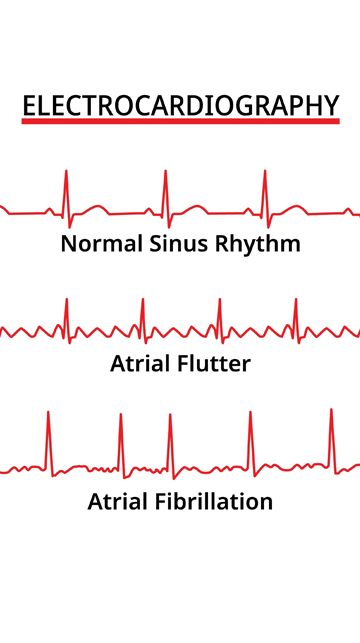Atrial Fibrillation or “AF” is a common irregular Heart Rhythm.
AF is a disorganized and chaotic electrical activity in the upper chambers of the heart (the Atria).
Symptoms:
Some people do not have symptoms of AF, yet you may experience:
- Shortness of breath
- Dizziness
- Fatigue or lethargy and
- Palpitations
Paroxysmal Atrial Fibrillation PAF
Occurs intermittently and reverts to a normal rhythm spontaneously without treatment.
Persistent Atrial Fibrillation
Occurs intermittently or continuously for more than a week and is treated by cardioversion or medication.
Permanent AF
Permanent AF is continuous, despite treatment of Medications and/ or Cardioversion.
Your Cardiologist may refer you for further treatment of AF with a Cardiac Electrophysiologist (Dr Shawn Foo, Dr Andy Gavin at Ascot Cardiology) for further assessment and treatment with a procedure called AF ablation.
If you are experiencing an abnormal irregular heart rate, then it is best to capture this on a tracing or an ECG.
A consultation with a Cardiologist will lead to an echocardiogram, to assess the structure and pumping function of the heart muscle, the movement of the heart valves and the flow of blood through the coronary arteries of the heart.
A Holter or Event monitor may be required to see what your heart rate and rhythm are and how often an arrhythmia is present when you are carrying out tasks of everyday living.
AF increases the risk of a blood clot forming inside the heart.
If a clot travels to the brain this could lead to a stroke.
Anticoagulation medication may be prescribed to prevent this from occurring.
An ECG, or tracing (from an Apple watch) is required so that your Cardiologist can assess the rate, and rhythm and plan your future treatment.
We recognise that it can be frustrating managing Atrial Fibrillation yet following the guidelines and sharing your experiences with friends and family, will help support you through.
Should you have any issues, concerns, or queries regarding your arrhythmia or treatment, please do not hesitate to contact us at Ascot Cardiology Group.
